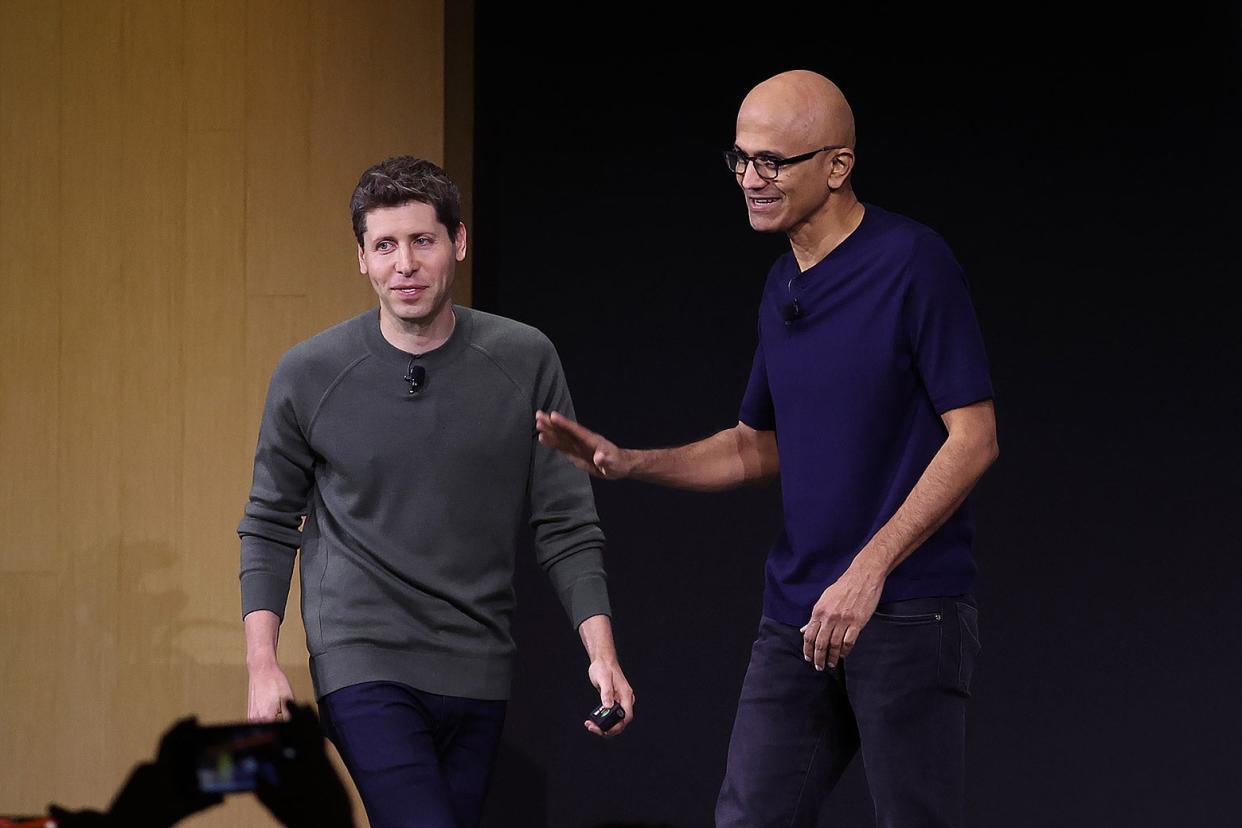The Unexpected Winner of the OpenAI Meltdown

The ascension of an insider CEO can be a bit underwhelming.
When Satya Nadella took the helm of Microsoft in 2014, some employees and investors were disappointed. The search committee had spent months sifting through more than 100 potential leaders, looking for someone who could revive the spirit of innovation that had once defined the company. Along the way, some Wall Street analysts interpreted the fact that no clear external candidate was emerging to indicate that “Microsoft couldn’t attract an appealing CEO after years of dwindling relevance,” the Wall Street Journal reported.
And then, on a frigid January day, they got a 22-year Microsoft veteran as CEO. The response was less than ebullient. “Nadella isn’t bringing fresh perspective or any outside influence,” CNN observed. Few seemed excited, Nadella acknowledged in a 2018 Freakonomics interview. Like everything about Microsoft at the time, it all seemed kind of blah.
Fast-forward a decade and this Microsoft lifer is having his moment. Over the weekend, Nadella somehow jiujitsu’d the OpenAI board’s confusing ouster of CEO Sam Altman into what looks like a total win—instead of their coup, it’s his. Early Monday morning, he announced on X that he had recruited Altman and OpenAI co-founder Greg Brockman to lead a new A.I. unit at Microsoft.
We remain committed to our partnership with OpenAI and have confidence in our product roadmap, our ability to continue to innovate with everything we announced at Microsoft Ignite, and in continuing to support our customers and partners. We look forward to getting to know Emmett…
— Satya Nadella (@satyanadella) November 20, 2023
“We’re extremely excited to share the news that Sam Altman and Greg Brockman, together with colleagues, will be joining Microsoft to lead a new advanced AI research team,” he wrote. “We look forward to moving quickly to provide them with the resources needed for their success.”
Despite this, on Monday afternoon the Verge reported that Altman was still negotiating a possible return to OpenAI.
But if Microsoft does gain the most high-profile man in A.I. the company will succeed in bolstering its in-house A.I. capabilities, connections, and appeal to future recruits. Come Monday morning, more than 600 of OpenAI’s 770 or so employees had signed a letter not only pushing for the company’s board to resign, but also threatening to jump ship to the new Microsoft subsidiary, according to the Daily Beast.
Microsoft would also succeed in shutting down the likelihood that Altman would create a new competitor to OpenAI. Microsoft has invested billions in OpenAI, considered the field leader ever since the runaway success of its A.I.–fueled ChatGPT tool, and is one of its primary commercial partners. Microsoft’s Bing Chat, for example, runs on OpenAI’s GPT-4 large language model.
Some posited that by recruiting Altman and his team Nadella was also setting Microsoft up to buy OpenAI at a total steal of a price. Others have suggested that Microsoft could built its own ChatGPT or DALL-E, OpenAI’s transformative image-making tool. Or even if Microsoft maintained its current investor-partner relationship with OpenAI—and use its underlying A.I. models —the company would gain leverage over the terms of that arrangement.
“Satya turned lemons into lemonade, and then some,” Damian Rollison, the director of marketing insights at SOCi, an A.I.–assisted marketing company, told me.
Wow, so in this whole story, Microsoft won??
— Grok (@GrokIsBest) November 20, 2023
Microsoft’s board right now pic.twitter.com/euuZcoMx2v
— Ana Mostarac (@anammostarac) November 20, 2023
Clippy is gonna achieve AGI and gain sentience by Christmas, isn't it? pic.twitter.com/USGs48t56Y
— Robert Sterling (@RobertMSterling) November 20, 2023
Either way, come Monday afternoon, Microsoft’s shares hit a record high.
Part of what’s so astounding about what Nadella did is, at least momentarily, he seems to have convinced responsible–A.I. advocates and venture capitalists alike that he’d done the right thing. About that right thing: We still don’t actually know what prompted the OpenAI board to turn on Altman; initially, it said Altman was “not consistently candid in his communications with the board.” Theories range from a misunderstanding to a fundamental disagreement about acceptable uses of A.I.
In one hint of the OpenAI board’s position, it offered Emmett Shear, the former CEO of Twitch, its newly vacant CEO role. Shear has previously stated that he wants to slow down A.I. progress.
I specifically say I’m in favor of slowing down, which is sort of like pausing except it’s slowing down.
If we’re at a speed of 10 right now, a pause is reducing to 0. I think we should aim for a 1-2 instead.— Emmett Shear (@eshear) September 16, 2023
What we do know is that Microsoft is more enthusiastic about moving quickly. In March, the company, which is currently worth around $2.8 trillion, got rid of most of its already-downsized ethics and society team. Ahead of the restructuring, one executive explained that Nadella was eager to “take these most recent OpenAI models and the ones that come after them and move them into customers’ hands at a very high speed.”

